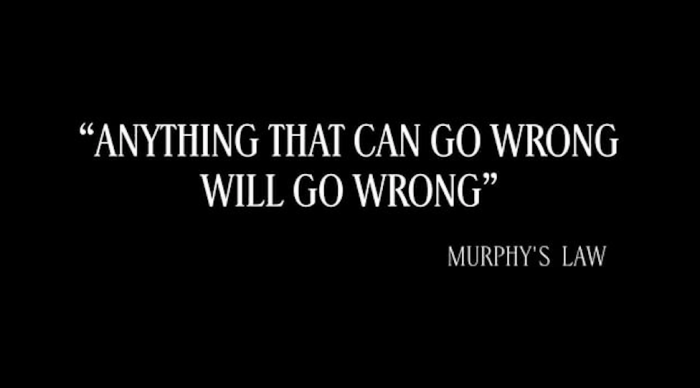What is a murphy law – What is Murphy’s Law? It’s a humorous, yet often frustrating, observation about the tendency for things to go wrong, especially when we least expect them. The saying, “If anything can go wrong, it will,” encapsulates the essence of this law, which has become a part of our everyday vocabulary.
The origins of Murphy’s Law can be traced back to the 1940s, with its namesake, Captain Edward A. Murphy Jr., a U.S. Air Force engineer. The law’s popularity has since grown, becoming a universal concept that resonates with anyone who has ever encountered unexpected setbacks or inconveniences. From spilled coffee to lost keys, Murphy’s Law reminds us that life is full of unpredictable events, and sometimes, things just don’t go as planned.
Introduction to Murphy’s Law
Murphy’s Law is a humorous, yet often accurate, observation about the tendency for things to go wrong, especially when they are most inconvenient. It’s a tongue-in-cheek way of acknowledging the unpredictability of life and the fact that things don’t always go according to plan.
Origin and History of Murphy’s Law
The phrase “Murphy’s Law” is attributed to Captain Edward A. Murphy Jr., an aerospace engineer working on a project for the U.S. Air Force in 1949. During a rocket sled experiment, a sensor was wired incorrectly, leading to the failure of the experiment. Murphy, frustrated with the error, famously declared, “If there are two or more ways to do something, and one of those ways can result in disaster, someone will do it.”
While this specific instance might be the origin of the phrase, the concept of things going wrong in unexpected ways has been around for centuries. Similar sentiments are found in proverbs and sayings across various cultures, suggesting that the idea of Murphy’s Law is a universal one.
Definition of Murphy’s Law
Murphy’s Law is often stated as: “Anything that can go wrong will go wrong.” This succinct definition captures the essence of the law, highlighting the inevitability of unforeseen problems and setbacks. However, it’s important to note that Murphy’s Law is not a scientific law but rather a humorous observation about human fallibility and the unpredictable nature of the world.
Examples of Murphy’s Law in Everyday Life
Murphy’s Law is often cited in everyday situations where things go wrong, highlighting the universal nature of this observation. Here are some common examples:
- You’re running late for a meeting and spill your coffee all over yourself.
- You’re trying to find your keys and realize you’ve left them in the car, which is locked.
- You’re cooking dinner and realize you’re out of a crucial ingredient.
- Your phone battery dies right when you need to make an important call.
These are just a few examples of how Murphy’s Law manifests in everyday life. It’s a reminder that things don’t always go as planned and that sometimes, even the simplest tasks can be met with unexpected obstacles.
The Essence of Murphy’s Law

Murphy’s Law, in its simplest form, encapsulates the idea that anything that can go wrong, will go wrong. This seemingly cynical statement reflects a profound truth about the nature of human experience and the inevitability of unforeseen complications.
The Core Principle of Murphy’s Law
At its heart, Murphy’s Law highlights the inherent unpredictability of life and the tendency for things to take an unexpected turn for the worse. It’s not a deterministic law, but rather a probabilistic observation of how events unfold. The law acknowledges that while we strive for order and control, there’s an inherent element of chaos that can disrupt our plans.
The Relationship Between Murphy’s Law and Human Fallibility
Murphy’s Law is deeply intertwined with human fallibility. Our limitations as individuals, from our susceptibility to errors in judgment to our inability to foresee every potential outcome, create a fertile ground for things to go awry. Murphy’s Law, in a sense, acknowledges our inherent vulnerability to mishaps and mistakes.
Murphy’s Law Compared to Other Similar Concepts
Murphy’s Law shares similarities with other concepts that explore the complexities of unintended consequences, such as the “law of unintended consequences” itself. The “law of unintended consequences” emphasizes the unforeseen and often negative results of actions, even those undertaken with good intentions. While Murphy’s Law focuses on the inevitability of things going wrong, the “law of unintended consequences” highlights the unpredictable nature of outcomes.
“If anything simply cannot go wrong, it will anyway.” – Edward A. Murphy Jr.
Applications of Murphy’s Law: What Is A Murphy Law
Murphy’s Law, with its pessimistic outlook, finds its relevance across various fields and situations, serving as a reminder of the potential for things to go wrong. It’s not about dwelling on negativity but rather recognizing the inherent uncertainties and preparing for potential setbacks.
Predicting Potential Problems
Murphy’s Law can be a valuable tool for anticipating potential problems, allowing us to mitigate risks and prepare for unexpected challenges. By considering the potential for things to go wrong, we can implement proactive measures to minimize the impact of such occurrences.
For instance, in project management, acknowledging Murphy’s Law encourages the creation of contingency plans. This involves identifying potential roadblocks and developing alternative solutions or backup strategies. By anticipating potential delays, resource shortages, or technical issues, project managers can better manage risks and increase the likelihood of successful project completion.
Examples of Murphy’s Law in Action
Murphy’s Law is not just a theoretical concept; it manifests in countless everyday situations. Here are some common examples:
- The dropped toast scenario: The adage “butter side down” perfectly encapsulates Murphy’s Law. The probability of a piece of toast landing butter-side down is significantly higher than it landing butter-side up, leading to a mess and frustration. This seemingly trivial example illustrates the principle that things tend to go wrong in the most inconvenient ways.
- The “missing sock” phenomenon: Many people experience the frustrating reality of mismatched socks. One sock mysteriously disappears from the laundry, leaving its partner alone and useless. This illustrates the tendency for seemingly small, insignificant things to go wrong, leading to unexpected consequences.
- The “last key on the keyring” syndrome: When you’re in a hurry and need a specific key, it’s always the last one on the keyring. This illustrates the tendency for the most needed item to be the least accessible, creating additional stress and frustration.
Coping with Murphy’s Law

While Murphy’s Law might seem like an inevitable force, it’s not entirely insurmountable. Understanding the nature of Murphy’s Law allows us to develop strategies for minimizing its impact and maximizing our chances of success. By embracing a proactive approach, we can navigate the unpredictable nature of life with greater resilience and a more positive outlook.
Strategies for Mitigating the Effects of Murphy’s Law
Murphy’s Law doesn’t necessarily dictate failure; it merely highlights the potential for things to go wrong. The key to coping lies in acknowledging this possibility and taking steps to minimize its impact.
- Plan for the Unexpected: One of the most effective ways to counter Murphy’s Law is to anticipate potential problems and develop contingency plans. By considering various scenarios, we can be better prepared to handle unexpected events. For instance, if you’re planning a trip, pack an extra set of clothes and essential toiletries in case of lost luggage.
- Embrace Redundancy: Redundancy acts as a safety net, providing backup options in case of failure. This can involve having multiple ways to accomplish a task or having backup equipment available. For example, if you’re presenting a project, having a printed copy of your slides in addition to a digital version can help you avoid technical difficulties.
- Focus on Prevention: Preventing problems before they occur is the most effective way to combat Murphy’s Law. This might involve thorough preparation, regular maintenance, or implementing quality control measures. For example, regularly servicing your car can help prevent unexpected breakdowns.
- Maintain a Positive Attitude: A positive mindset can help you stay resilient in the face of adversity. When things go wrong, try to remain calm and focus on finding solutions rather than dwelling on the problem.
Tips for Anticipating and Avoiding Potential Problems, What is a murphy law
Proactive planning is a key element in minimizing the impact of Murphy’s Law. By anticipating potential issues, we can take steps to avoid them or minimize their consequences.
- Identify Potential Risks: Take the time to analyze the tasks you’re undertaking and identify potential risks or points of failure. For example, if you’re planning a hiking trip, consider the weather conditions, terrain, and your physical abilities.
- Develop Contingency Plans: Once you’ve identified potential risks, develop contingency plans for how you will address them. For example, if you’re traveling, pack a small first-aid kit and ensure you have access to emergency contact numbers.
- Seek Expert Advice: Don’t be afraid to seek advice from experts in their respective fields. If you’re embarking on a new project, consult with professionals who have experience in that area.
- Embrace Flexibility: Be prepared to adjust your plans as needed. Things rarely go exactly as planned, so maintaining flexibility will help you adapt to unexpected circumstances.
Step-by-Step Guide for Effectively Dealing with Murphy’s Law in Everyday Situations
Dealing with Murphy’s Law effectively requires a combination of preparation, adaptability, and a positive attitude. Here’s a step-by-step guide to help you navigate challenging situations:
- Acknowledge the Problem: The first step is to acknowledge that something has gone wrong. Avoid denial or blaming others. Accepting the reality of the situation allows you to move forward with a solution-oriented mindset.
- Assess the Situation: Once you’ve acknowledged the problem, take a moment to assess the situation. What exactly went wrong? What are the potential consequences? This step helps you understand the scope of the problem and develop a plan to address it.
- Develop a Solution: Based on your assessment, brainstorm possible solutions. Consider your resources, time constraints, and the potential impact of different options. Don’t be afraid to think outside the box and explore creative solutions.
- Implement the Solution: Once you’ve chosen a solution, implement it promptly. Procrastination can only worsen the situation.
- Evaluate the Outcome: After implementing your solution, take the time to evaluate the outcome. Did it solve the problem? Were there any unforeseen consequences? This step helps you learn from your experience and improve your approach for future situations.
The Humor and Irony of Murphy’s Law

Murphy’s Law, with its cynical outlook on life, has a peculiar ability to elicit both frustration and amusement. The humor inherent in Murphy’s Law lies in its ironic twist on reality, highlighting the unexpected and often inconvenient turns life can take.
The Role of Humor in Understanding Murphy’s Law
Humor plays a crucial role in understanding Murphy’s Law by making it more palatable. It allows us to cope with the inevitability of misfortune by finding a lighthearted perspective. The absurdity of Murphy’s Law, with its prediction of everything going wrong, can be a source of laughter, helping us to detach from the stress of potential failures. Humor can be a coping mechanism, providing a sense of relief and perspective when faced with seemingly unavoidable mishaps.
Irony and Satire in Murphy’s Law
Murphy’s Law is inherently ironic, as it points out the discrepancy between our expectations and the reality of events. The law itself serves as a satirical commentary on the human condition, highlighting the fallibility of our plans and the unpredictability of life.
For instance, the statement “If anything can go wrong, it will” is ironic because it acknowledges the inevitability of misfortune while simultaneously expressing a sense of helplessness. This irony creates a humorous effect, as we recognize the truth of the statement while simultaneously laughing at its cynical nature.
Humorous Anecdote Based on Murphy’s Law
Imagine a scenario where a person is preparing for a crucial job interview. They have spent hours meticulously planning their outfit, practicing their answers, and even researching the company’s history. However, as they are about to leave their house, a series of unfortunate events unfolds:
- They spill coffee on their freshly ironed shirt.
- Their car battery dies, leaving them stranded.
- They realize they have forgotten their resume.
This humorous anecdote perfectly encapsulates the spirit of Murphy’s Law, demonstrating how even the most meticulously planned events can be derailed by a string of unforeseen mishaps.
Ultimate Conclusion
While Murphy’s Law may seem like a cynical view of the world, it can also serve as a valuable reminder to be prepared for the unexpected. By understanding the principles behind this law, we can develop strategies for mitigating potential problems, anticipating unforeseen circumstances, and ultimately, navigating the inevitable bumps in the road with a sense of humor and resilience.
Essential Questionnaire
What are some examples of Murphy’s Law in action?
Examples include dropping your phone as you’re about to take a picture, missing your bus by a minute, or encountering a traffic jam when you’re already running late.
Is Murphy’s Law a real law?
No, it’s not a scientific law, but rather a humorous observation about human fallibility and the tendency for things to go wrong.
How can I avoid the effects of Murphy’s Law?
While you can’t entirely avoid Murphy’s Law, you can mitigate its effects by planning ahead, being prepared for unexpected events, and developing a positive attitude towards setbacks.